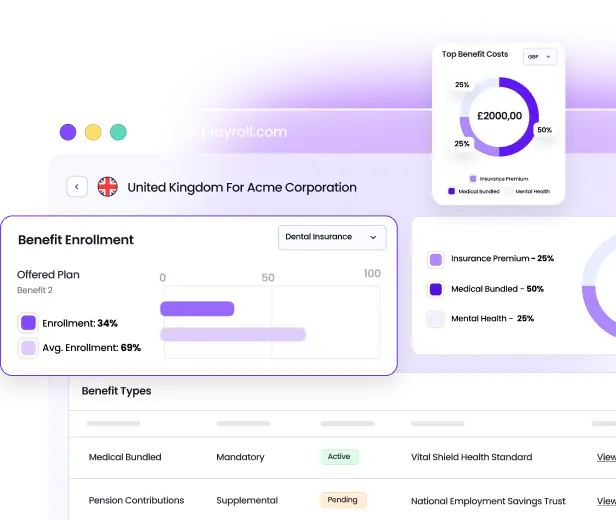Who Is Entitled to Employee Benefits in Chile
All employees working under a formal employment contract in Chile are entitled to statutory employee benefits as defined by the Chilean Labor Code (Código del Trabajo). These benefits apply to both Chilean nationals and foreign employees working locally.
Entitlement to benefits typically depends on the type and duration of employment. Full-time employees receive the full range of statutory benefits, including health insurance, pension contributions, and paid leave. Part-time and temporary workers are also entitled to some benefits proportionally, depending on their working hours and employment contract terms.
Overview of Employee Benefits in Chile
Employee benefits in Chile are an integral part of the country’s labor system and workplace culture. Compared to many other Latin American countries, Chile maintains a structured framework of social security and mandatory contributions designed to protect employees’ health, income, and long-term financial stability.
Beyond legally required benefits, many employers in Chile also offer supplemental perks—such as meal vouchers, health insurance upgrades, and flexible work arrangements—to attract and retain skilled professionals in a competitive market.
Mandatory Employee Benefits in Chile
Mandatory benefits are legally required and form the core of any employee benefits package in Chile. Here’s a comprehensive list of mandatory benefits in Chile:
Pension Contributions (AFP)
All employees must contribute to Chile’s private pension system known as Administradoras de Fondos de Pensiones (AFP). Employers are responsible for deducting 10% of an employee’s salary for pension contributions, plus administrative and disability insurance fees. The AFP system ensures long-term income security after retirement.
Health Insurance (FONASA or Isapre)
Employees contribute 7% of their gross salary to health insurance. They can choose between the public system (FONASA) or a private insurer (Isapre). Employers handle the deductions and remittance. This system guarantees access to healthcare and is one of the pillars of Chile’s social protection framework.
Paid Annual Leave
Employees who have worked for at least one year are entitled to 15 working days of paid annual leave. Employers must coordinate vacation schedules while ensuring compliance with labor law requirements. Annual leave promotes employee well-being and work-life balance.
Maternity and Paternity Leave
Female employees receive six weeks of paid prenatal and 12 weeks of paid postnatal leave, covered by social security. Fathers are entitled to five days of paid paternity leave. These benefits promote family welfare and gender equality in the workplace.
Severance Pay
In cases of dismissal without cause, employees are entitled to severance pay equal to one month’s salary per year of service, up to a maximum of 11 months. This is a crucial safeguard ensuring income continuity during job transitions.
Supplemental Employee Benefits in Chile
Supplemental benefits are not required by law, but can help you stand out as an employer and attract top talent. They include:
Private Health Insurance (Isapre Upgrades)
Many employers offer additional coverage under private Isapre plans, which include higher-tier health networks, faster service, and broader medical coverage. These benefits appeal to professionals seeking enhanced healthcare for themselves and their families.
Meal and Transportation Vouchers
Meal or transport allowances are common perks, often provided through prepaid cards or vouchers. While not mandatory, they ease employees’ daily costs and enhance satisfaction.
Flexible Work Arrangements
Flexible or hybrid working arrangements are becoming increasingly popular, especially in tech and professional services. These policies improve work-life balance and productivity, particularly post-pandemic.
Performance Bonuses and Profit Sharing
Employers often use bonuses or profit-sharing schemes to motivate staff. These are typically performance-based and serve as incentives that improve engagement and retention.
Private Life and Accident Insurance
Some employers offer additional life and accident insurance beyond statutory requirements. These benefits provide peace of mind for employees and their families.
Tax Implications of Employee Benefits in Chile
Employee benefits in Chile are generally subject to taxation, with certain exceptions:
- Pension and health insurance contributions are tax-deductible for employees.
- Employer-provided benefits such as bonuses or allowances are taxable as part of the employee’s income.
- Employers can often deduct benefit-related expenses from corporate taxes.
Documentation must include payroll records, social security contributions, and tax receipts for compliance.
Legal Considerations for Employee Benefits in Chile
Employee benefits in Chile are governed by the Chilean Labor Code and the Social Security Act. Employers must register employees with social security institutions, make timely contributions, and issue payslips reflecting all deductions.
Failure to comply with benefits regulations can result in fines, back payments, and legal action from the Labor Directorate (Dirección del Trabajo). Employers should regularly review benefit structures—ideally annually—to ensure compliance with updated labor laws and contribution rates.
How Benefits Impact Employee Cost
Employee benefits represent a significant portion of overall payroll costs in Chile—typically around 25–35% of gross salary when including mandatory contributions.
To manage costs effectively, employers can:
- Automate payroll and compliance tracking.
- Offer flexible or performance-based supplemental benefits.
- Partner with an in-country payroll provider to ensure compliance and efficiency.
Providing strong benefits helps improve employee retention, satisfaction, and productivity—key factors for long-term business success.
Disclaimer
THIS CONTENT IS FOR INFORMATIONAL PURPOSES ONLY AND DOES NOT CONSTITUTE LEGAL OR TAX ADVICE. You should always consult with and rely on your own legal and/or tax advisor(s). Playroll does not provide legal or tax advice. The information is general and not tailored to a specific company or workforce and does not reflect Playroll’s product delivery in any given jurisdiction. Playroll makes no representations or warranties concerning the accuracy, completeness, or timeliness of this information and shall have no liability arising out of or in connection with it, including any loss caused by use of, or reliance on, the information.
.svg)
.svg)
.svg)





.svg)



.png)












.webp)









.svg)